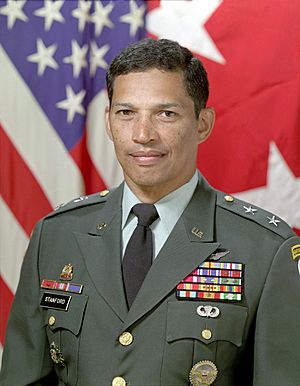John Stanford (general) facts for kids
Quick facts for kids
John Stanford
|
|
|---|---|

Stanford as a Major General in 1987
|
|
| Birth name | John Henry Stanford |
| Born | September 14, 1938 Darby, Pennsylvania, U.S. |
| Died | November 28, 1998 (aged 60) Seattle, Washington, U.S. |
| Buried | |
| Allegiance | United States of America |
| Service/ |
|
| Years of service | 1961–1991 |
| Rank | Major General |
| Alma mater | Penn State, B.A., 1961 |
| Spouse(s) | Patricia |
| Children | 2 sons |
| Other work | Fulton County Executive, Superintendent of Seattle Public Schools |
John Henry Stanford (born September 14, 1938 – died November 28, 1998) was a very important leader. He was a Major General in the United States Army. Later, he became the head of the public schools in Seattle.
Contents
Growing Up and School
John Stanford was born in Darby, Pennsylvania. This town is near Philadelphia. He went to Yeadon High School. Then, he studied at Pennsylvania State University. He earned a degree in political science. Later, in 1975, he got another degree from Central Michigan University. This one was about managing people.
Military Career
Stanford joined the U.S. Army in 1961 after college. He became a Major General. This is a very high rank. He served during the Vietnam War and Operation Desert Storm. He also worked for the Secretary of Defense, Caspar Weinberger. Stanford was trained as an infantry officer. He also flew planes. He received important awards for his service. These included the Distinguished Flying Cross and several Air Medals.
Leading Fulton County
In 1991, Stanford was chosen to lead Fulton County, Georgia. This county includes the city of Atlanta. Local leaders praised his work. He wanted to make the county government more efficient. He aimed to cut down on unnecessary rules and spending. Sometimes, disagreements among county officials made this work difficult.
Leading Seattle Schools
In 1995, John Stanford was asked to lead the Seattle Public Schools. He had not worked in education before. He became the first African-American leader of the school district. Stanford believed the school system was slow and focused too much on itself. He said it cared more about the comfort of staff than the students.
When he arrived, Stanford made many changes. He moved about one-third of the school principals to new roles. He said that poor service from staff could lead to them losing their jobs. He also stated that students who did not meet learning goals would not move to the next grade. He also wanted new schools to be built on time and within budget. He also worked to end desegregation busing.
Stanford was seen as a strong and well-liked leader. In his first year, he helped raise over $2 million in donations. These funds supported new school programs. During his time, fewer students dropped out of Seattle schools. Also, SAT test scores went up. The Seattle school board said he met all his goals. However, some teachers did not like his focus on standardized tests. He also had to stop a plan for companies to sponsor school activities. Parents did not agree with this idea. Some of his other ideas, like school uniforms, did not happen.
In 1996, Stanford gave a speech at the Democratic National Convention.
His Death
In April 1998, Stanford announced he had leukemia. This is a type of cancer. He received treatment in Seattle. He died seven months later, at age sixty.
His Legacy
News of Stanford's death was on the front page of The Seattle Times. A memorial service was held at the University of Washington. About 2,500 people attended. He was buried with military honors the next day. This was at Arlington National Cemetery. Important people like Colin Powell and Richard Riley were there.
The main office for the Seattle school district was renamed after him. It is now called the John Stanford Center for Educational Excellence. Also, Latona School was renamed the John Stanford International School.
After Stanford's death, a special fund was created. It is called the Stanford Endowment. It helps pay for teacher training programs. The Bill & Melinda Gates Foundation gave $2 million to this fund.
Stanford's book, Victory in Our Schools, was published after he died. In the book, he wrote that schools should be run like businesses. He believed they should focus on performance. Al Gore wrote the introduction for his book.
 | Sharif Bey |
 | Hale Woodruff |
 | Richmond Barthé |
 | Purvis Young |

